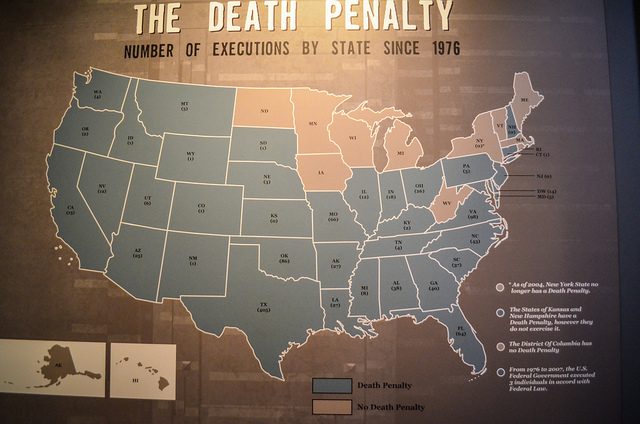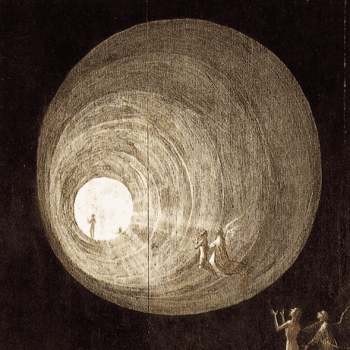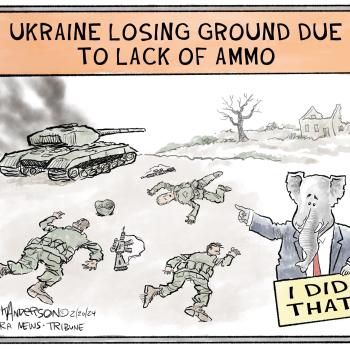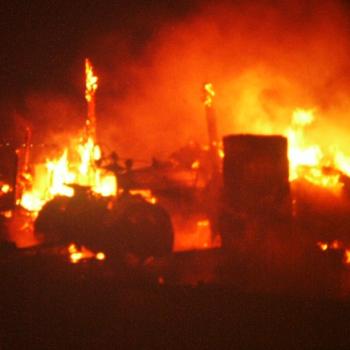
I’m always the outlier. No matter what the question, as soon as the crowd starts yelling Huzzah!! I’m the one standing slightly aside, saying “wait a minute now.”
I guess that means it’s no surprise that I’m the one saying “wait a minute now” about Catholic bloggers joining together in opposition to the death penalty. Not, mind you, that I favor the death penalty. And I certainly support Catholic bloggers getting together in support of Church teaching. I think that kind of initiative is long overdue.
My “now, wait a minute” in this instance is based on those confounding truths that reality often imposes on idealism when public policy is the question. This reality is multifarious, and I’m mentally and physically tired this morning. So I’m going to abandon long-winded explanations and number my thoughts. Here we go.
- Any question of public policy has to be decided based on one object: A just and stable government is always the greater good.
- There are people who cannot be allowed loose in the larger population. To do so would be to ignore government’s responsibility to provide for the public safety.
- The death penalty is not usually necessary to achieve this aim of a just and stable government in advanced societies which are capable of keeping people locked up.
- Innocents are convicted of crimes, including capital crimes, that they did not commit.
- When innocent people are executed by the state, the death penalty becomes an egregious wrong. It not only does not provide for the public safety, it abrogates it in this instance.
- Thus the death penalty is not necessary in most instances in advanced societies, and in the case of innocents who are wrongly convicted, it is a grave moral injustice.
- However, (you knew this was coming, right?) if, for whatever reason, it is not possible to keep killers off the streets, then the death penalty becomes a necessity. (Go back to point one.)
- Also, there are instances, when murderers murder for political or philosophical reasons, where incarceration may be a means and method for them to spread their murderous politics and philosophy further and enlist others to murder in the name of that politics or philosophy.
- Certain members of Boko Haram/ISIS/Islamic Brotherhood/Taliban/etc fit the criteria of number 8. Certain Bolsheviks fit the description of number 8 at earlier points in history.
- When people in our prisons use their prison time to enlist fellow prisoners in a murderous pact which they then unleash on the civilian population once they are freed, then simply incarcerating these people becomes a violation of point number 1.
- What to do? Do we use the death penalty selectively on people who murder for politics or philosophy? That is a dangerous business which will — I guarantee it — be abused. Once you allow government this type of power to selectively kill, government will — once again, I guarantee it — get around to using it on anyone who annoys those in power.
- We must, as a matter of guaranteeing point number 1, think clearly and without our usual social lies about points 7, 8, 9, 10 and 11 when constructing laws about the death penalty.
This numbered list is my way of saying, “now wait a minute” about the death penalty. I oppose the death penalty. So far as I know, I am alone among the Catholic bloggers in having the votes and the scars to prove my opposition to the death penalty. In addition to questions about the death penalty, I have had to vote on many laws that changed the lives of millions of people. It is an awesome thing to hold that kind of power in your hands. It changes how you look at questions like this.
I oppose the death penalty within the parameters of the basic principle that a just and stable government is always the greater good. I oppose the death penalty so long as opposition to the death penalty does not endanger the public health and safety. I oppose the death penalty whenever there are just alternatives. In practical terms, that means I oppose the death penalty in almost all circumstances in Western society.
But I know full well that there are situations that make the death penalty necessary. I’m on record in support of the death penalty for Jihadi John. My reasoning has nothing to do with the horror of his crimes. I am calling for the death penalty for Jihadi John for two reasons. One, allowing him to live in prison leads to the recruitment of other murderers. Two allowing him to live in prison makes him a living martyr, an on-going symbolic reference point for those of his murderous philosophy.
Jihadi John, and all of ISIS, commit crimes that are not just crimes against the persons on whom they inflict them. They commit crimes that are crimes against the structure and fabric of civilization and humanity as a whole. That is what a crime against humanity constitutes. It is a crime that attacks the bedrock of human civilization and that destroys and diminishes all of humanity in a real and rending way.
I believe that those who commit crimes against humanity, in particular the leaders, figureheads and mouthpieces of such crimes, should be put to death. I also think that their bodies should be consigned to the sea in unmarked locations. They deserve no monument, no memoriam.
I am opposed to the death penalty. I am one of the few death penalty opponent bloggers who has actually voted against the death penalty in my role as an elected official and taken the hits that go with that action. When I say that I oppose the death penalty, I mean it, and I can prove that I mean it. However, I have to say “wait a minute” when we talk about a mindless and blanket end to the death penalty in all circumstances.
A just and stable government is always the greater good. Thumb through history, look around the world, and you will see what happens and how many innocent people die when governments are unjust and unstable. Unjust, unstable government is a killer on a mass scale. Given modern communication and weaponry, unjust and unstable government is a scythe, mowing down whole populations in short periods of time.
For that reason, when I consider blanket responses to questions of public policy, I am often forced to say, “Wait a minute …”
The death penalty is no exception.

















